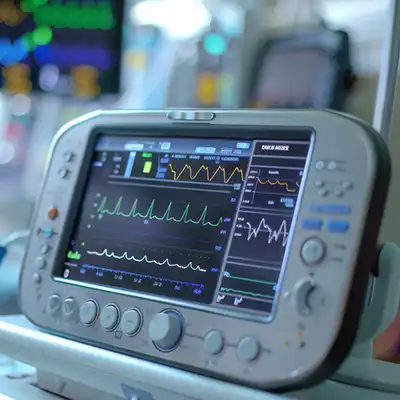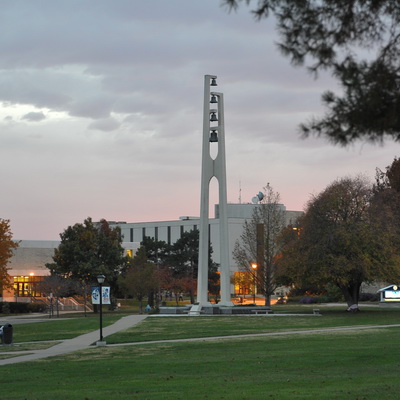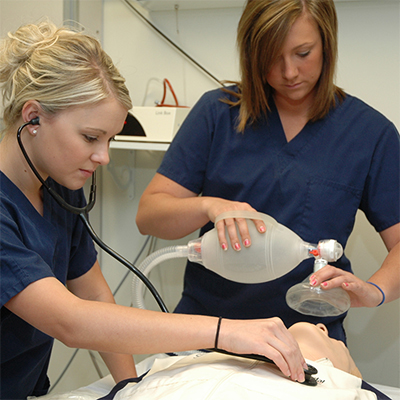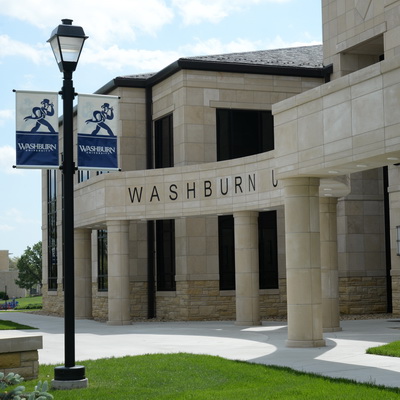
What is Respiratory Therapy?
Join one of the fastest growing fields in health care by becoming a respiratory therapist. These professionals provide respiratory care for trauma patients and those with heart and lung disorders. A wide range of career opportunities are available. For example, you may provide immediate patient care at the bedside or work in an emergency room to assist in establishing an airway or delivering lifesaving breathing treatments. Another opportunity may include collaborating with physicians in intensive care units to manage ventilators. Or, you might join an air-ground transport team that transfers critically ill patients. Become an essential member of a health care team by choosing a career that's in high-demand and provides daily rewards.
Why Washburn for Respiratory Therapy?
Earn an Associate of Applied Science degree in Respiratory Therapy in just two years at Washburn University. Our program develops qualified graduates who can deliver safe and effective respiratory care and patient education. During five semesters, you will study in the classroom and spend extended time in the hospital and clinical setting. Learn to perform basic cardiopulmonary assessments and treatments as well as cardiopulmonary diagnostics and trauma care. Instruction also covers patient education on topics such as COPD and asthma. Upon graduation, you will be prepared to take the national credentialing examination that leads to the Registered Respiratory Therapist (RRT). Among the benefits at Washburn:
- Our central location allows for a well-rounded clinical experience. Washburn's affiliations range from smaller hospitals, as far west as Hays, to those in the Kansas City area that provide the highest levels of complex care.
- Our smaller class sizes, limited to 18 students, result in close interaction with faculty. In the lab, our student to faculty ratio is 6:1 and it is 1:1 in the clinical setting.
- Washburn offers a classroom simulation lab specifically for Respiratory Therapy students.
- After completing your associate of applied science degree, Washburn provides a path to a Bachelor of Health Science (BHS) degree with an emphasis in either Health Services Administration or Medical Imaging. Our graduates can both work and continue their education to become a critical care nurse, Certified Registered Nurse Anesthetist (CRNA), pharmacist, sonographer or even a physician.
Choosing to become a respiratory therapist comes with a lot of responsibility and a personal commitment to care for patients who are seriously ill. These professionals typically feel a strong sense of accomplishment and know that their work is important.

Application Process
- Admission is based on academic record and the ability to perform essential functions. Apply by Feb. 1.

Essential Functions
- Students must meet essential requirements to ensure success in both their clinical coursework and later in the workforce.

Clinical Experience
- Respiratory Therapy students are required to complete 18-credit hours of clinical education. Washburn offers a wide variety of site options.

Degree Plan
- Washburn University offers a 69-credit hour plan for an Associate of Applied Science degree in Respiratory Therapy.
Take a Closer Look
Respiratory therapists have high standards, with specialty board examinations provided by the National Board for Respiratory Care (NBRC) and licensure of respiratory therapists is determined by each individual state. Our faculty are committed to guiding you through your educational journey and into this highly rewarding field.
Ida Johnson, MHS, RRT - Program Director
785.670.2171; ida.johnson@washburn.edu
Shannon Walls, BHS, RRT - Clinical Coordinator
785.670.2172 ; shannon.walls@washburn.edu
Upon satisfactory completion of the two-year program, you are eligible to take the Therapist Multiple Choice (TMC) Examination and the Clinical Simulation Exam (CSE) from the National Board for Respiratory Care (NBRC) to earn your credentials. Once successfully credentialed, you are eligible to complete exams for the following advanced credentials:
- Adult Critical Care Specialist (ACCS)
- Asthma Educator Specialist (AE-C)
- Registered Pulmonary Function Technologist (RPFT)
- Neonatal/Pediatric Specialist (NPS)
- Sleep Disorders Specialist (SDS)
The Washburn University Respiratory Care Program, #200323, Associate of Applied Science degree, Topeka, KS, is accredited by the Commission on Accreditation for Respiratory Care (CoARC) (www.coarc.com).
CoARC accredits respiratory therapy education programs in the United States. To achieve this end, it utilizes an ‘outcomes-based’ process. Programmatic outcomes are performance indicators that reflect the extent to which the educational goals of the program are achieved and by which program effectiveness is documented.
Outcomes data from the Annual Report of Current Status has been posted on the CoARC website.
Professional Licensure Disclosure Respiratory Therapy
Washburn University is regionally accredited by the Higher Learning Commission (HLC), and is reporting this information in compliance with Criterion 2.A. and 2.B. The Respiratory Therapy program is accredited by the Commission on Accreditation for Respiratory Care (COARC).
This program is designed to meet the educational requirements for respiratory therapists in Kansas. Please review the website for the Kansas State Board of Healing Arts for additional details about obtaining licensure in the state of Kansas. If you intend to seek licensure outside of Kansas after finishing your program, use the link above to find information on the state or U.S. territory in which you intend to be licensed in order to identify whether Washburn's Respiratory Therapy program meets the educational requirements.
You can also review the licensing information for each state outlined by the National Board for Respiratory Care (NBRC).
For more information, please contact allied-health@washburn.edu.
Program Mission
The Respiratory Therapy program is focused on the development of qualified graduates who are prepared to provide the essentials for the safe and effective delivery of respiratory care and patient education.
Program Goal
To prepare graduates with demonstrated competence in the cognitive (knowledge), psychomotor (skills), and affective (behavior) learning domains of respiratory care practice as performed by registered respiratory therapists (RRTs).
Bachelor's Degree
Many students continue to complete a Bachelor of Health Science (BHS) degree with an emphasis in Health Services or Medical Imaging at Washburn University.
By the Numbers
Employment of respiratory therapists is projected to grow by 19% by 2029 which is much faster than the average for all occupations. Growth in the middle-aged and elderly population will lead to an increased incidence of respiratory conditions such as chronic obstructive pulmonary disease (COPD) and pneumonia. (source: U.S. Bureau of Labor Statistics).
Experienced Salary
$89,170
Program Cost
Courses in this degree program are offered at the traditional undergraduate rate. Competitive scholarships are available to declared School of Applied Studies majors who qualify for the awards. Other scholarship opportunities are available through professional organizations such as Kansas Respiratory Care Society (KRCS) and American Association of Respiratory Therapy (AARC).
Dr. William "Bill" Leeds Scholarship Fund
The Dr. William "Bill" Leeds Scholarship Fund is awarded to students properly accepted, enrolled, and in good standing in the Respiratory Therapy Program at Washburn University. Dr. Leeds was a wonderful and colorful man, a great physician, and friend. He served as the Medical Director for the Respiratory Therapy Program at Washburn University for over a decade. He touched the lives of many students and showed great enthusiasm for his work in the medical field. The loss of Dr. Leeds was a tragedy to our community but his contributions to health care and Respiratory Therapy will continue on through this scholarship.
To apply for this scholarship and all other scholarships you may be eligible for through the School of Applied Studies, please click the button below.
Apply Now
Admission to the program is based on academic record (GPA/college level courses with a C average or better) and the ability to perform essential functions of the profession. Completed application packets must be received by February 1 for the next fall semester. The secondary deadline is June 1. The program will continue accepting applications after June 1 if openings exist. Acceptance to Washburn University does not constitute acceptance to the Respiratory Therapy program. The Washburn University Respiratory Care Program, #200323, Associate of Applied Science degree, Topeka, KS, is accredited by the Commission on Accreditation for Respiratory Care (CoARC) (www.coarc.com). CoARC accredits respiratory therapy education programs in the United States. To achieve this end, it utilizes an ‘outcomes-based’ process. Programmatic outcomes are performance indicators that reflect the extent to which the educational goals of the program are achieved and by which program effectiveness is documented. Outcomes data from the Annual Report of Current Status has been posted on the CoARC website. Washburn University is regionally accredited by the Higher Learning Commission (HLC), and is reporting this information in compliance with Criterion 2.A. and 2.B. The Respiratory Therapy program is accredited by the Commission on Accreditation for Respiratory Care (COARC). This program is designed to meet the educational requirements for respiratory therapists in Kansas. Please review the website for the Kansas State Board of Healing Arts for additional details about obtaining licensure in the state of Kansas. If you intend to seek licensure outside of Kansas after finishing your program, use the link above to find information on the state or U.S. territory in which you intend to be licensed in order to identify whether Washburn’s Respiratory Therapy program meets the educational requirements. You can also review the licensing information for each state outlined by the National Board for Respiratory Care (NBRC). For more information, please contact allied-health@washburn.edu. The Washburn Respiratory Therapy program is in alignment with the National Center for Education Statistics (NCES) CIP Code 51.0908 Respiratory Care Therapy/Therapist. A program that prepares individuals, under the supervision of physicians, to assist in developing respiratory care plans, administer respiratory care procedures, supervise personnel and equipment operation, maintain records, and consult with other health care team members. Includes instruction in the applied basic biomedical sciences; anatomy, physiology, and pathology of the respiratory system; clinical medicine; therapeutic procedures; clinical expressions; data collection and record-keeping; patient communication; equipment operation and maintenance; personnel supervision; and procedures for special population groups.Accreditation
Professional Licensure Disclosure Respiratory Therapy
Application Packet
Degree Plan
Contact Us
GET IN TOUCH WITH Department of Allied Health
Allied Health Department
School of Applied Studies, Room 201
1700 SW College Ave.
Topeka, KS 66621
Phone & Email
785.670.2170
allied-health@washburn.edu

